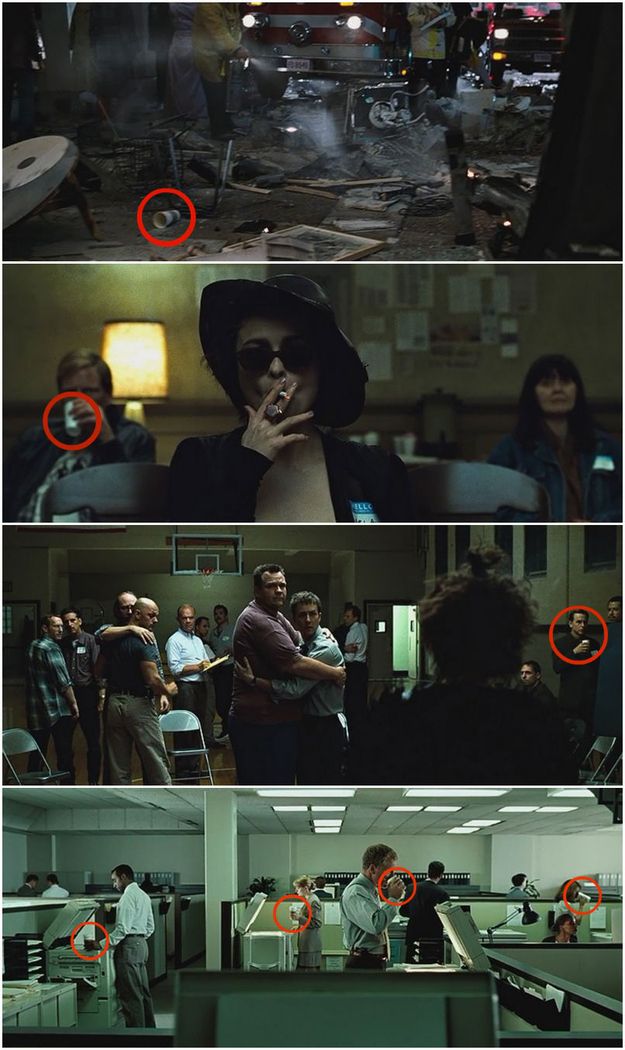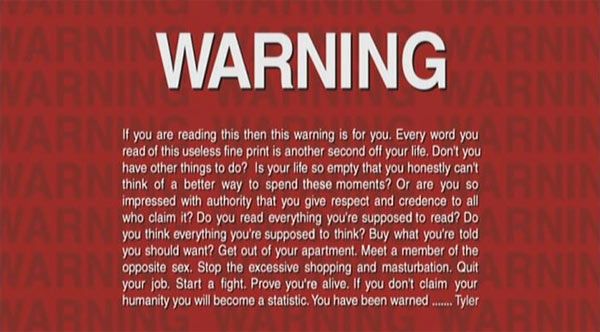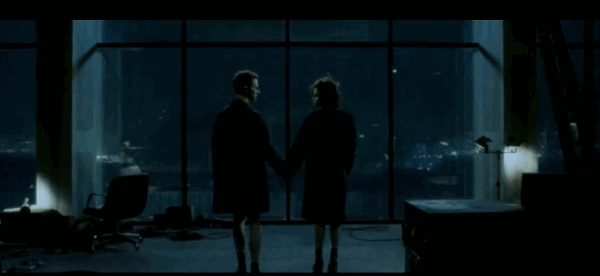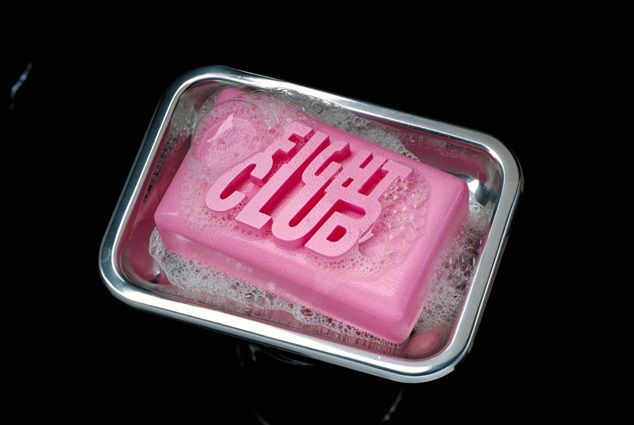"Welcome to Fight Club. The first rule of Fight Club is..."
There are very few films that have the ability to define and capture the Zeitgeist of a generation but David Fincher's nihilistic, anarchic and anti-capitalist masterpiece did just that.
Fight Club is 16 years old today and I'm delighted to say that it still has the ability to pack a cinematic punch, simply because there are so many ways to appreciate and enjoy the film.
It's possible to read Fincher's masterpiece as an examination of the male psyche that's under attack from an an increasingly emasculated and commercialized world. You can also see it as a rebellious blow to the face of corporate America but simply put, it's a wonderful film about soap that's written, acted and shot superbly.
I think it's all of the above, so with that in mind we're going to break the first rule of Fight Club, 16 times in fact, and tell you why we love it so much...
The epic speech from Tyler Durden
If we had to define the film in just a few words then it would be this rousing battle cry from the unhinged and magnetic co-founder of Fight Club.
https://www.youtube.com/watch?v=98LeLZ2crZE
David Fincher's direction
I'm a huge fansof David Fincher and Fight Club is just one of his masterpieces, which says a lot considering he also made
Se7en, The Social Network and Zodiac.
His adaptation of Chuck Palahniuk’s novel is incredibly faithful and it's unlikely that a director has been so perfectly suited the subject material in front of him.
For example, Palahniuk’s book is written in the first-person narrative but studio bosses wanted this removed from the film. Cue this ballsy response from the director, “they wanted to make ‘Fight Club’ without a voiceover, so I fired that producer."
I am Jack's frustration at Hollywood suits.
Fincher also deserves massive credit for agreeing to direct the film in the first place because the studio making it, Rupert Murdoch's Fox, were the same people that bastardised his feature debut Alien 3.
The talented filmmaker also managed to raise the film's budget from $23m to $63m - that can buy you a lot more soap.
Away from studio wrangling, there is so much to love about the film's aesthetics like the kinetic camerawork, gritty fight sequences and the ominous lighting.
This is one of our favourite scenes because it shows the directors immense visual style while also emphasising the sad consumer driven existence of Ed Norton's narrator.
https://www.youtube.com/watch?v=dN8vyO8ILD8
The Casting
Prior to working with David Fincher on Se7en, Brad Pitt's only memorable parts of note were supporting roles in Thelma & Louise, True Romance, Kalifornia and Legends of the Fall.
The director found his on screen muse with Pitt and the actor repaid his trust with a brilliant performance as the effortlessly charismatic, fiercely intelligent and incredibly psychotic Tyler Durden.
Russell Crowe was linked to the part but the casting of Pitt was inspired because it allowed him to rebel against his Hollywood pretty boy image, which he did with relish.
Pitt's meticulous performance was a two-fingered salute to those Hollywood types who tried to pigeonhole him as a 'safe-bet' because he jumped off the screen and managed to burn a place in the audiences memory far deeper than even the most painful chemical burn.
To paraphrase Tyler himself, Pitt was "smart, capable and most importantly, free in all the ways that you are not."
As for the rest of the cast, did you know that Sean Penn and Matt Damon were considered for The Narrator role while Reese Witherspoon, Winona Ryder and Sarah Michelle Gellar were all in contention for Marla?
The commitment from the actors in the film is amazing especially considering Meatloaf actually needed an oxygen mask after every scene he did because his prosthetic fat-suit weighed so much, while Pitt and Norton actually took boxing and soap-making classes.
This fantastic quote from Tyler
"You're not your job. You're not how much money you have in the bank. You're not the car you drive. You're not the contents of your wallet. You're not your f#*king khakis. You're the all-singing, all-dancing crap of the world."
One of the best fight sequences ever
https://www.youtube.com/watch?v=ZBpj7Ny88HE
The themes of the novel and film
"Did you know that if you mix equal parts of gasoline and frozen orange juice concentrate you can make napalm?"
The beauty of Fight Club is that Fincher managed to mix a multitiude of styles and genres into this Molotov cocktail of a film. It's possible to read Fight Club in lots of different ways because it's deliberately equal parts satire, horror, romance, drama and thriller all rolled into one.
Is it a modern satire on the dehumanizing effects of corporate/consumer culture? Does it represent the anarchic wishes within all of us to strike out against 'the man'? Does it represent a modern day re-imagining of Jekyll and Hyde persona but with an office worker/ terrorist dynamic? Is it a rallying cry for men to do whatever it takes to defend their masculinity in a world that’s hell bent on ripping it away from them?
Are we getting too deep into this?
I am Jack's existentialist crisis.
The hidden gems
For example, did you know that there is a Starbucks coffee cup in almost every scene of the film?

The subliminal shots of Tyler
Before Tyler properly enters the Narrator's life, when they're sitting together on the plane, he appears six times in the film as a subliminal flash that occurs when the Narrator experiences a moment of frustration or anger during his insomnia daze.
If only Ed Norton could stay calm like a Hindu cow.
Take a look.
https://www.youtube.com/watch?v=7sAeCVm3unw
Fincher v Studio
It takes a brave person to stand up to David Fincher when he's making a film because the director is fiercely protective of his work and actors.
As detailed in the brilliant book Rebels on the Backlot, it was the director's idea to push for the brilliant special effects-laden $800,000 title sequence and Fincher also refused to trim the violence when asked.
The studio also had no idea how to market the film, their initial adverts ran during WWF commercials, so Fincher hired his own ad agency to market the film.
Timeless life advice from Tyler Durden
On possessions - "The things you own end up owning you."
On choice - "It's only after we've lost everything that we're free to do anything."
On progress- "You wanna make an omelette, you gotta break some eggs."
On materialism - "We're consumers. We are by-products of a lifestyle obsession."
The subliminal warning that appeared on the DVD
 The gut wrenching fights
The gut wrenching fights
While most of the sweaty, bare-knuckle and blood spraying fights look incredibly brutal on screen the initial scene where Brad Pitt and Ed Norton fight outside the bar has a funny back-story.
The Narrator was supposed to fake punch Brad Pitt but at the last minute Fincher asked Norton to do it for real. The wince of pain from Brad Pitt in this scene is very real.
https://www.youtube.com/watch?v=Lu0xbOJ6fFo
You can read it as part of a trilogy
In Se7en the character of Mills also meets his meets his evil alter ego , John Doe, and is eventually coerced into murdering him just like The Narrator and Tyler.
In The Game, it's only when Michael Douglas loses all his possessions and will to live that he truly appreciates the value of his life, just like the Narrator.
In all three of these films, external people control every decision, actions and narrative journey of Mills, The Narrator and Nicholas.
The Ending
Never before have song lyrics so perfectly fitted the visuals and plot that were unfolding on screen. "With your feet in the air and your head on the ground..."
https://www.youtube.com/watch?v=x9Huy-JP1xo
In typical Tyler Durden fashion, did you know that in the last scene of the film there's a single frame flash of male genitalia, just like Tyler would insert into films at his projectionist job.

This Poster

The reaction to it
When the film opened in America, US audiences didn't instantly take to Fincher's film because there was a misjudgement that it was an action movie about underground bare-knuckle boxing contests. Audiences missed the point completely.
By the time its tour of US cinemas was over, Fight Club had grossed just $37m, considerably less than the $63m it cost to make. Want to know what films did better than it at the box-office on their opening weekend? Anna and the King and 10 Things I Hate about You.
One of Fight Club's producers, Art Linson, recalled the first screening of the film for Fox's executives; they were, he said, “flopping around like acid-crazed carp wondering how such a thing could even have happened.”
The New York Observer described it as a "film without a single redeeming quality, which may have to find its audience in hell." Roger Ebert said it was "cheerfully fascist" and "a celebration of violence."
Much like all great cult films though Fight Club found its audience in the rental market, its DVD release was one of the most successful in Fox's history and managed to push the movie back into profit.
Much like Marla meeting the Narrator, the movie met me "at a very strange time in my life". I'll never forget it though.




 The gut wrenching fights
The gut wrenching fights
